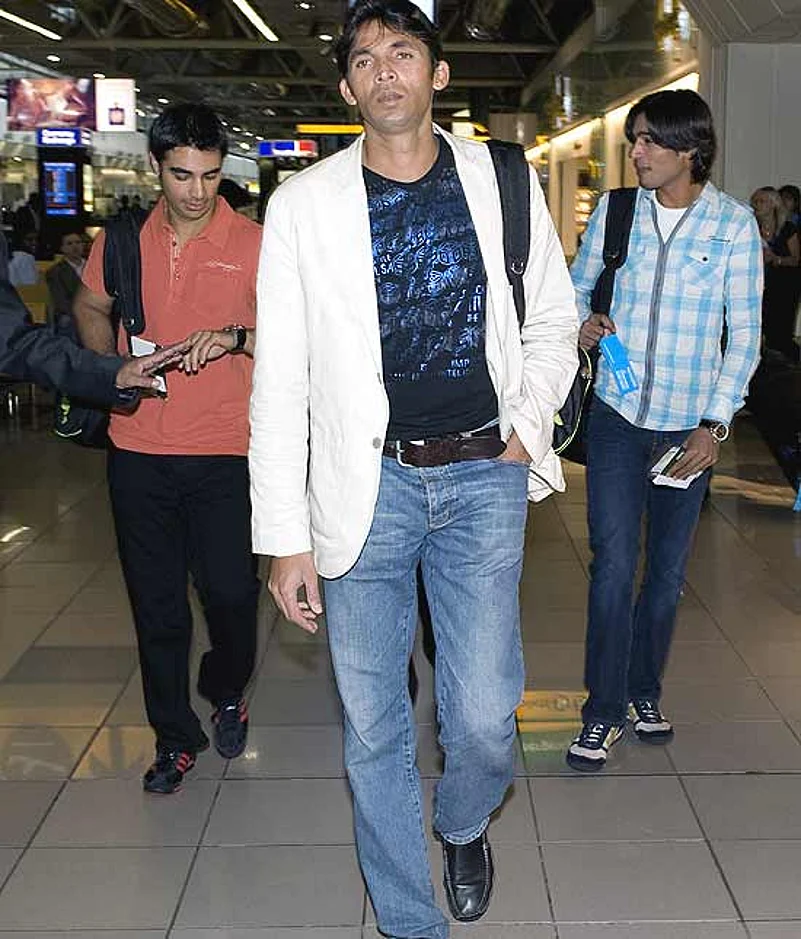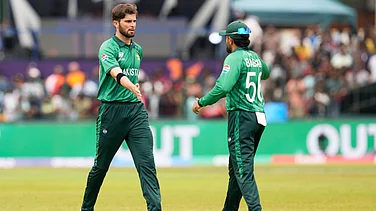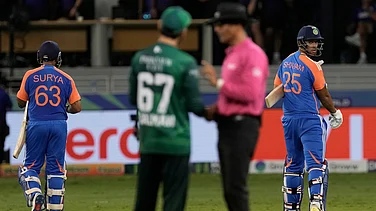When Imran Khan puts away his jacket and shalwar-kameez for something altogether more hip—a jacket and jeans, for example—one of two things, we know, is happening. Either he is summering in London, or a World Cup is approaching.
Imran is a particularly visible invocation every four years. No doubt, to the many unable to make up their minds about his honest but jarringly conservative politics, it is sweet relief to deal with him simply as Pakistan’s greatest cricketer and the first to lead them to a world title, if only for a couple of months.
He will do a spot of analysis for local and international sports channels through the World Cup in that familiar monotone of a baritone. The World Cup is the only time he really talks old shop anymore. “Champions learn from defeat,” he explains in a promo, watching a visual of himself 19 years younger, at the Melbourne Cricket Ground, arms raised and a private, satisfied smile the only indication that he’s just won a World Cup. “But never lose himmat, because himmat always wins,” he strains.
One ad campaign evokes the themes you suspect Imran did not have time to shoot: jazba and junoon. Himmat, jazba, junoon—these are the measures of modern Pakistan cricket and perhaps they have been forever. Himmat, or courage, we will come to. The jazba—the spirit, the feeling—it must be said, is currently not particularly intense. It would’ve been greater, of course, had Pakistan been a venue and not just legal co-host of the 2011 World Cup: being at your own party is never a bad idea. The Pakistan Cricket Board won’t much mind; still entitled to hosting rights money, they earn over $10 million without the considerable cost of organising matches.
That international cricket cannot return for some time has still not been fully understood by everyone—or at least not the depths of concern foreign teams have about touring. But the outrage of the first few months after the decision not to host the World Cup here was taken two years ago has mostly been expended. How could it not after the hyphenated horror of Spot-fixing-gate? Most people believe the decision to be an Indian conspiracy. There is nothing in Pakistan that isn’t a conspiracy, not even the floods of 2010. Indian, American, Jewish—we choose our poison accordingly.
But for now the issue lurks silently, uncomfortably, in the back. No doubt it will return at an appropriate moment, perhaps as excuse for an early exit, perhaps as misplaced vindication in a longer run to the knockout stages: “You took the Cup from us, see what we did!”
Jazba is also difficult to rouse in the aftermath of Pakistan’s performances in the last two World Cups. Each of the 2003 and 2007 tournaments was preceded by spectacularly ill-judged hype. Concerts were held, special issue CDs came out, advertisers jumped in, and for what? Two first-round exits and the death of a coach? Fooling everyone yet again is not so easy.

Dire straits A PAF chopper brings Sri Lankans to the field in Lahore after a terrorist ambush on March 3, ’09. (Photgraph by AFP, From Outlook, February 21, 2011)
Meanwhile, the junoon—madness in a very literal sense in this instance—grips Pakistan cricket tighter than ever, diverting minds away from the World Cup. The spot-fixing case has ripped out the heart of the side. The final verdicts on Salman Butt, Mohammed Asif and Mohammed Amir only came last Saturday, but on SMS, Twitter, Facebook, TV shows were people who thought, hoped, wished the trio could, somehow, miraculously, make it back.
Till two weeks to the World Cup, Pakistan didn’t even have a captain for the event, a situation only they could possibly even imagine, let alone conceive. Players had not been happy with Shahid Afridi, the man who led the ODI side in the last year. So the cricket board didn’t name him leader when the squad was announced; Misbah-ul-Haq, participator in all of two ODIs through 2010, was a typical alternative, typical because he was precisely the guy all boards, bar the Pakistan Cricket Board, would rule out first. He wasn’t a rational option, though it could be argued that Afridi was never one in the first place. This is a kind of permanent madness, a junoon.
Advertisers knew something else: in two major World Cup-themed campaigns, Afridi appears very much as a leader. Misbah is not even in the ads. One TV poll said 97 per cent of the respondents wanted Afridi as captain. Afridi was duly named, having led the side to a first ODI series win in over two years in New Zealand.
But there is some himmat in this side. Captaincy aside, not much of the squad selection prompted debate. Unlike the last two World Cups, there are plenty of eager young men ready to do what eager young men always want to do: prove themselves. It’s difficult to imagine the world not hearing more from Ahmed Shahzad, Umar Akmal, Asad Shafiq or Wahab Riaz in this tournament. And there is just enough experience to keep the testosterone in check. Even Shoaib Akhtar is behaving.
Given what they’ve been through in the last year, they’ve not done too badly. South Africa and England were both pushed hard in the ODI series in extremely difficult circumstances. New Zealand were defeated in New Zealand. Some bright politician will also no doubt remember that the last time Pakistan got to the final of a World Cup, in 1999, a democratic government was in place, busy taking the country to disaster. The only time they won the World Cup? Democracy again.
All the while, as names and faces change, superstars come and go, captains are fired and hired, hurricanes and cyclones blow, Pakistan’s basic character, one that so endears it to the rest, remains: put in a corner, they come out with the greatest force. And as a spectacle, that’s difficult to better.
Osman Samiuddin is Pakistan editor of ESPNCricinfo.com


























